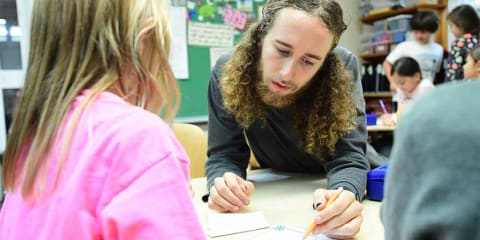The Sarah Lawrence College Art of Teaching program is an integrated Master of Science in Education (MSEd) program of study that leads to triple New York State certification in Early Childhood Education (birth to grade 2), Childhood Education (1st to 6th grade) and Early Childhood Students with Disabilities.
Academic Program
Program Overview
- Art of Teaching is a child-centered (birth through 6th grade), culturally sensitive, interdisciplinary teacher education program centered on observation of children.
- The program is committed to public education, including urban schools. Graduates find teaching positions in a range of public and private schools.
- Seminar-style courses provide an intimate intellectual setting in a collaborative community of individuals.
- Graduate students reflect a range of ages and backgrounds. Students discover a great deal about how they themselves learn in every class by recollecting, reflecting on, and sharing their own learning experiences in childhood and as adults. This sharing significantly informs the inquiry into teaching and learning.
- Students learn not only how to observe, but also how to articulate and describe what they see. The “Prospect Descriptive Processes” provide important strategies for observing and documenting children and teaching practices. Patricia Carini, under whose leadership these processes were developed, has been a major influence on the program.
- The program uses a strength-based and individualized approach to working with children with disabilities
- Students work with children at every point in the program—outside the classroom; in their jobs; at the Early Childhood Center; and in fieldwork and student teaching placements at public and independent schools.
- Each student’s work culminates in an oral presentation of a focused master’s project, accompanied by documentation of coursework and work with children in classrooms.
- The program prepares students to integrate the New York State Common Core Curriculum Standards into their practice, and leads to New York State Early Childhood Education (birth to grade 2), Childhood Education (1st to 6th grade) and Early Childhood Students with Disabilities Teacher Certification.
- The program provides ongoing support for alumni and their colleagues through a Saturday Seminar Series.
Program Requirements
The Art of Teaching is designed as one program that offers triple New York certification in Early Childhood Education (birth to grade 2), Childhood Education (1st to 6th grade) and Early Childhood Students with Disabilities.
The triple certification program may be completed in two years and a summer on a full-time basis, or in three years and two summers on a part-time basis.
Given the recent legislation signed by Governor Hochul, the Art of Teaching program is no longer requiring prospective applicants submit GRE or other graduate-level examination scores. We will continue to conduct a holistic assessment of an applicant’s potential based on their personal statement, writing sample, letters of recommendation, and transcripts.
View the Office of Teaching Initiatives section of the New York State Education Department (NYSED) website for information about certification.
Typical Course of Study
Year One
- Inclusive Emergent Curriculum & Responsive Environments (5 credits)
- Theories of Development (5 credits)
- Observation and Documentation (3 credits)
- Neurodiversity and Special Education: History, Policy, Practice (5 credits)
- Human Development in Context (3 credits)
- Clinical Perspectives: Challenges to Child and Adolescent Development (5 credits)
- Field Work (Early Childhood, 4 credits)
Summer (Online)
- Foundations of Education (3 credits)
- Children’s Literature (3 credits)
Year Two
- Language and Literacy I & II (10 credits)
- Mathematics and Technology I & II (10 credits)
- Practicum Seminar (3 credits)
- Art of Teaching Graduate Seminar (3 credits)
- Student-Teaching (two age/grade levels, 6 credits)
- Master’s Thesis project (2 credits)
Dual Degree in Art of Teaching & Child Development
The collaboration between our Art of Teaching and Child Development programs and across the entire Children, Childhood, and Education Collaborative is long-standing and unique. Over the past several years, we have worked to formalize these collaborations and intersections further to bring prospective students a whole host of ways in which to pursue their studies.We are pleased to announce the launch of a Dual Degree in the Art of Teaching and Child Development. This new program will take three years to complete and lead to a MS degree in Child Development and an MSEd degree in the Art of Teaching and an MA degree in Child Development. Learn more.
Program Accreditation
The Art of Teaching Program at Sarah Lawrence College is a member in good standing of the Association for Advancing Quality in Educator Preparation (AAQEP), a national accrediting organization recognized by the Council for Higher Education Accreditation. In 2022, Art of Teaching was awarded full accreditation by AAQEP through December 31, 2028. Full accreditation acknowledges that a program prepares effective educators who continue to grow as professionals and has demonstrated the commitment and capacity to maintain quality.
After reviewing the evidence collected through a process of self-study and peer review, the AAQEP Accreditation Commission issued the decision at its January 28 meeting along with the following rationale:
The Commission evaluated the program’s evidence for each AAQEP standard and determined that all four standards are met. Completers of the program are prepared to work effectively as professional educators who are able to adapt to different contexts and to grow professionally. Guided by a clear and coherent theoretical and philosophical foundation, the provider has the capacity to analyze evidence of its own effectiveness and to make program revisions that benefit candidates. It engages with stakeholders and partners to support candidates’ development and to strengthen the P-20 education system in the region.
“Congratulations to Sarah Lawrence College and to all of the faculty, staff, and stakeholders who have achieved their goal of national accreditation by AAQEP,” said AAQEP President and CEO Mark LaCelle-Peterson. “The program’s clear commitment to developing candidates holistically as people and professionals is shown in its reflective practice and in its persistent efforts to ensure access and support to a diverse group of new teachers.”

